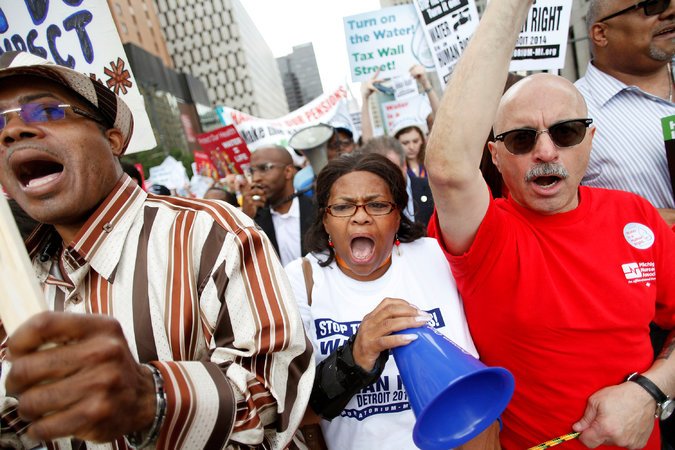News
Hundreds in Detroit Protest Over Move to Shut Off Water

DETROIT — At least 300 demonstrators marched through downtown streets on Friday, protesting a move by the city’s Water Department to force tens of thousands of delinquent customers to pay up or face a cutoff in service. From the Cobo Center to Hart Plaza on the banks of the Detroit River, protesters chanted, “Fight, fight; water is a human right.” Others carried placards that read “Thirsty for Justice.”
The Detroit Water and Sewerage Department began cracking down on accounts in March. The number of delinquencies swelled over the winter when the department, fearing frozen pipes, continued to provide service to customers with past due accounts. From March to June 30, the department interrupted service to 15,200 customers, said Greg Eno, a department spokesman. About 92,000 customers are at risk of having service cut off, meaning they are at least 60 days past due or more than $150 behind.
In a statement released on Friday, however, Kevyn D. Orr, the city’s emergency manager, said that of the accounts where water was suspended, more than half were made current within 24 hours, and service was restored. He said that assistance was available for customers with “demonstrated financial need.”
In March, about half the department’s customers, including businesses, had outstanding balances, amounting to $118 million in charges, the department said.
One protester, Valerie Blakely, said a truck with “Detroit Water Collections Project” lettered on its side stopped by her house on Monday. She said that she kept workers from disconnecting her service, but that they turned off the water to nearly every house on her block.
“I told them they weren’t shutting mine off today, and put my foot over the access point,” said Ms. Blakely, who lives in Detroit with her husband and four children. She said she fell behind while trying to keep her house warm during one of the worst winters in Michigan history. Ms. Blakely, who owes about $1,000 on her water bill, said her neighbors are up in arms.
“They were all out in the street, not knowing what to do, not knowing how they were going to cook,” she said.
Tyrone Travis, a former General Motors autoworker who owns his home, said he, too, faced service interruption because of a $700 bill. “I’m on a fixed income like a lot of Detroiters, and by the time I get through buying medicine, gas and a little food, I just don’t have it,” he said.
Rome Adams works for Go Detroit, a community organization that is helping to get bottled water to affected residents. “This morning I went to one block and some people across the street who saw me with water came running out of their houses to see if I could give them some,” he said.
“I’ve lived in Detroit my whole life,” Mr. Adams said. “I’ve never seen anything like this.”
Mr. Eno declined to comment on the rally, but said the number of customers who had made arrangements to avoid a loss of service rose to 17,000 through June from 11,000 in February. “This is what we’ve wanted,” he said. People are getting the message.”
The step up in shut-offs has riled many residents in a city that filed for bankruptcy protection a year ago and is seeking revenue where it can. On Tuesday, Steven W. Rhodes, the federal bankruptcy judge handling the case, said the city’s enforcement program was damaging Detroit’s reputation and called on the city to better address the issue. Mr. Orr defended the department’s efforts, saying customers could make arrangements to pay.